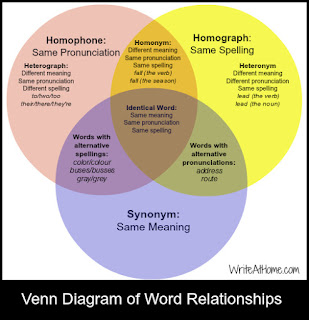Homographs
Homographs
2. can also be pronounced with a short "a" sound and refer to a person who supports or pleads the cause of another.
It refers to a word that is spelled the same as another word but has a different meaning.
There are not many words like this, but the common ones are sometimes mispronounced, and learning the correct pronunciation will avoid misunderstandings.
There is a whole class of homographs that end in -ate, usually with one being a verb and the other being a noun or an adjective related to it. For example:
Advocate:
2. can also be pronounced with a short "a" sound and refer to a person who supports or pleads the cause of another.
Some common examples are (capital letters sound stronger to each meaning):
- ADdress (noun – the location of a building)
- COMpound (noun – something made of two or more parts)
comPOUND (verb – to combine or add)
- CONtest (noun – a game or event of competition)
- CONtract (noun – a written agreement)
- DEcrease (noun – the total reduction in the amount of something)
- DIgest (noun – a compilation of information)
- ENtrance (noun – a place of access such as a door or gate)
EXtract (noun – something taken from a larger work or substance)
exTRACT (verb – to remove or pull out)
- INcline (noun – a slope or hill)
INcrease (noun – the amount that something has grown)
inCREASE (verb – to become greater or larger)
- OFfense (noun – the players on a sports team that attack or advance)
- PERfect (adjective – something that is as good as it can possibly be)
- PREsent (noun – a gift)
- PROduce (noun – food that has been grown, such as vegetables)
- PROject (noun – a large or extended task or piece of work)
- PROtest (noun – a group of people organized to display objection to something)
- REcord (noun – a written account of information)
- REfund (noun – the amount of money returned to someone)
- REject (noun – an item that is defective or inadequate)
- SUBject (noun – the topic of a conversation or a book)
- TRANSport (noun – a system for moving objects or items)
- UPset (noun – an unexpected defeat of a champion sports team)

Comments
Post a Comment